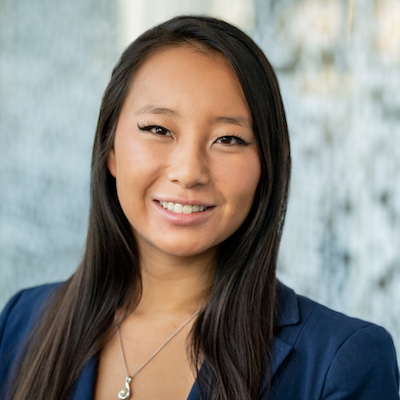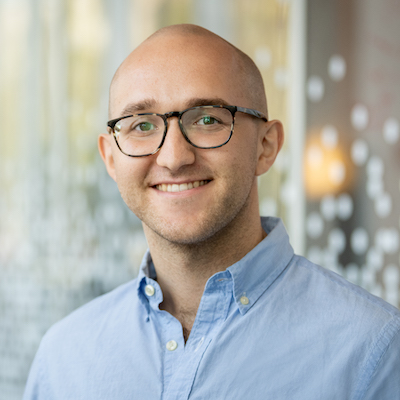With undergraduate degrees in STEM fields, two Align students turn to computer science to advance their careers
Author: Aditi Peyush
Date: 07.07.21
A high school trip to Kenya inspired Lily Bessette’s goal to change the world. “I saw a lot of impoverished areas and places where healthcare was just not a human right, so I really wanted to be a patient advocate and become a doctor for underserved populations,” she explained.
Bessette, a graduate student in the Align program, has designed her pathway to healthcare to incorporate a strong foundation in computer science. Her fellow student, Vaughn Franz, combined his love for physics and experience in the Peace Corps teaching math and science to further explore a STEM field he had always been curious about.
Supplied with a degree in biology and math from Boston College, in 2018 Bessette began working for Brigham and Women’s Hospital (BWH) as a research assistant in the Division of Pharmacoepidemiology. Here, Bessette studies how medications are prescribed and used on a population level and develops methods to optimize prescription drug use, among other things. Working at BWH, Bessette speculated that a deeper understanding of data science would facilitate her work. “I saw a lot of operations that could be automated, like lots of copy, pasting, and formatting of data into spreadsheets and analyses I wanted to perform by myself, so I figured, ‘Hey, it’ll probably be good if I learned how to code,’” she said.
 Lily Bessette (Align MSCS ’21)
Lily Bessette (Align MSCS ’21)
At the time, she wasn’t sure if she wanted to pursue a further advanced degree, like a Ph.D. or an M.D. Her hesitation was grounded in the fact that she wanted to gain experience in the field first to ensure that this was the path she wanted to follow. Bessette found the Align program when she was searching for ways to learn how to code. After consulting with her bioinformatics professor at Boston College about whether a coding bootcamp or a master’s in CS would be better, he said that the answer was “hands down MSCS” if she wanted to move forward in academia. She was enthusiastic about pursuing her degree because she saw how beneficial it would be in advancing methods in pharmacoepidemiology.
While Bessette was drawn to the study of computer science to extend and deepen her earlier professional experiences, her Align classmate Vaughn Franz was spurred by pure curiosity. He is fascinated with the theory of everything, which is the hypothetical presence of a single, all-encompassing theoretical framework of physics that fully explains and links all physical aspects of the universe. Franz studied physics as an undergraduate at the University of Chicago, but it didn’t stop there. Immediately after finishing his undergraduate degree, he joined the Peace Corps. For two years, Franz served in Tanzania as a math and physics teacher in a secondary school.
 Vaughn Franz (Align MSCS ’22)
Vaughn Franz (Align MSCS ’22)
The newness of living and teaching in Tanzania prompted Franz to think about options for his future path. He had coded as an undergraduate, but never had the time to pursue it seriously. With the possibilities of computer science in mind, he said, “I just thought about how practical it is along with the ability to build things – it’s really cool.”
Once he decided to pursue a degree in computer science, though, he worried over “not having a background in computer science.” He reported, “When I discovered the Align program, I was so excited, and the rest is history.”
Shifting from the classroom to a meaningful co-op
With her background in biology and math, as well as her work experience in pharmacoepidemiology, Bessette discovered she was able to apply her knowledge to her courses in the Align program. “It was really rewarding to see how interdisciplinary the field of computer science can be because there are just so many applications.” She elaborated, “It’s kind of its own field in itself, but it’s kind of everywhere at this point – no matter what you’re doing, it’s useful.”
Similarly, Franz used his background in physics as a tool in the program. Drawing similarities between his studies in computer science to earlier experiences in physics, he explained, “It’s similar in a way that you have to be very persistent and focus on the new concepts for a while at a time – having the math background helps too.”
Franz has had satisfying academic experiences in the Align program, reporting, “The program gives you a really, really strong foundation to move forward with really strong fundamentals in CS, algorithms, and data structures.”
To fulfill the program’s co-op requirement, Bessette decided to continue her work at BWH, explaining, “It’s a good place to apply what I’ve learned at Northeastern to innovate, make systems better, and apply analytical skills to research.” She currently balances her part-time job as a project coordinator at BWH with her Khoury coursework along with an Amazon Web Services summer internship as a solutions architect. She said that the impact of her time in the Align program translates into her work: “I teach a lot of skills that I’ve learned to my research assistants so that if and when they need to, they can do it on their own.”
Bessette incorporates concepts she learned from Machine Learning (CS 6140) into developing new methods to analyze data. “My past two courses in machine learning and Causal Modeling in Machine Learning (CS 7290) have been really applicable to what I do. For example, I’m working on a manuscript predicting falls in patients with atrial fibrillation and another looking at latent classes in congestive heart failures,” she said.
Following his interests in technical concepts, for his first co-op Franz joined Neo4j, a graph database management system developed by Neo4j, Inc. During his interview, he was able to speak to other employees, which led him to accept the position. On the company’s work, he added, “Just the fact that they make technology that’s very cutting edge and has a lot of cool uses is awesome.”
As a consulting engineer intern, Franz juggles different projects, “two of which are coding, kind of software development, and one is a machine learning project,” he said. He also assists the principal consultants with ongoing projects, such as writing test cases or developing a bit of code.
At Neo4j, Franz works with Java, which he learned in Object-Oriented Design (CS 5004) “I also took a databases course; graph databases are a little bit different from traditional relational databases and understanding what makes a graph different from a relational one has been truly helpful for my work,” he explained.
Bringing computer science knowledge into their futures
Bessette and Franz are advised by Ethan Selinger, co-op coordinator for the Align MSCS program. Selinger praised their work ethic, saying “Both are so open and eager to learn and grow, they were able to utilize their previous experiences with the skills developed in the MSCS program as an asset to finding opportunities and direction in the tech field.”
Selinger commented on Bessette’s adaptability with her co-op, saying “Lily has been working for a number of years at Brigham and Women’s, and was able to strategically shift her role to a co-op experience that has allowed her to explore her interests and abilities in healthcare and tech and prepare for her goals post-MSCS.” Praising Franzs’ desire to help others, Sellinger said, “It’s great that he has found a role such as his consulting engineer co-op at Neo4j that has allowed him to not only develop his technical expertise but also play a role in enhancing the client/consumer experience of the company’s products.”
With the knowledge and skills gained from the Align program, both Bessette and Franz are pursuing different post-graduate plans. Bessette’s desire to become a doctor didn’t fade – in fact, she just completed the MCAT in hopes to pursue a joint degree MD-PhD program after graduating from the Align program in December 2021. Bessette mentions that the MSCS was an important steppingstone, explaining, “Without these technical skills, I wouldn’t be as competitive, but with them, they make me a more well-rounded and unique candidate.”
Franz will continue working at Neo4j until July 9. After his anticipated graduation in 2022, Franz will begin searching for full-time positions. With his dynamic knowledge in computer science, he sees opportunities in “a number of different career paths, specifically within software engineering.” Data science, artificial intelligence, and machine learning are other interests, about these, he said, “I think these technologies are proliferating very rapidly and becoming much more accessible right now.” Until then, he’s keeping an eye out for the next great advancement in theoretical physics.